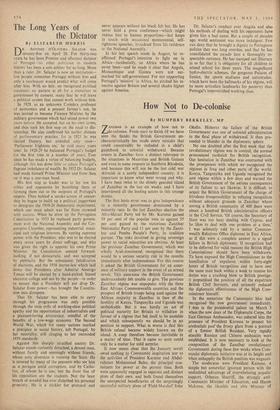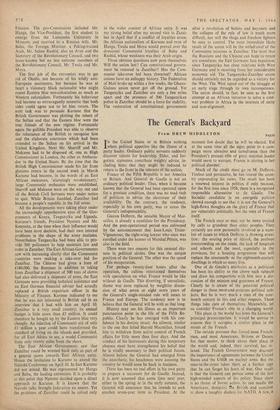How Not to De-colonise
ZANZIBAR is an example of how not to de-colonise. From start to finish (if we have seen the finish) the British Government un- characteristically has made every mistake that could conceivably be included in a child's guidebook to colonial withdrawal. Because events in Zanzibar have a distinct relevance to the situations in Mauritius and British Guiana and even in some respects to Southern Rhodesia, and because this will not be the last cold war skirmish in a newly independent country, it is important to know what went wrong and why. I have been twice to the closely guarded island of Zanzibar in the last six weeks, and I have interviewed all the leading actors in this strange drama.
By HUMPHRY BERKELEY, MP
The first basic error was to give independence to a minority government dominated by a minority race. In the last Zanzibar election the Afro-Shirazi Party led by Mr. Karume gained 54 per cent of the popular vote as against 35 per cent gained by the victorious Zanzibar Nationalist Party and 11 per cent by the Zanzi- bar and Pemba People's Party, its coalition partner. The risks involved in giving sovereign power to racial minorities are obvious. At least the previous Zanzibar Government, which was wholly Arab-dominated, recognised that there would be a serious security risk in the months immediately after independence. For this reason it asked the British Government for an assur- ance of military support in the event of an armed revolt. This assurance the British Government understandably felt unable to give. The previous Zanzibar regime was unpopular with the three East African Commonwealth countries and the prospect of British troops being used against the African majority in Zanzibar in face of the hostility of Kenya, Tanganyika and Uganda was unthinkable. But it was hardly an act of political maturity for Britain to withdraw in favour of a regime that felt itself to be unstable and which subsequently we should be in no position to support. What is worse is that this British refusal became widely known on the island. A coup therefore became inevitable in a matter of time. That it came so soon could only be a matter for mild surprise.
It now seems clear that the January revolt owed nothing to Communist inspiration nor to the activities of President Karume and Abdul- rahman Mohammed Babu, the principal con- testants for power at the present time. Both were apparently engaged in separate and distinct plots of their own, and both found themselves the unexpected beneficiaries of the surprisingly successful military plans of 'Field-Marshal' John
Okello. Hitherto the failure of the British Government was one of colonial administration in the final phase of withdrawal. It then pro- ceeded to blunder in the diplomatic sphere.
No one doubted after the first week that the revolutionary regime was in control, the normal pronounced yardstick for British recognition. Our hesitation in Zanzibar was contrasted with the promptness with which we recognised the regimes in Iraq and other parts of the world. Kenya, Tanganyika and Uganda recognised the new regime within a few days and warned the British Government of the serious consequences of its failure to act likewise. It is difficult to acquit the British Government of the charge of frivolous irresponsibility in refusing recognition without adequate grounds in Zanzibar where among a British community of 400 there were about a hundred British administrative officers in the Civil Service. 'Of course, the Secretary of State was too busy dealing with Cyprus, and he likes to deal with one problem at a time,' I was solemnly told by a senior Common- wealth Relations Office diplomat in East Africa, as if this were a complete answer to a signal failure in British diplomacy. If recognition had to be deferred for valid reasons the British High Commissioner should have been withdrawn. To have exposed the High Commissioner to the humiliation of expulsion within forty-eight hours of British recognition and to have sent the same man back within a week to resume his duties was a crushing blow to British prestige; it jeopardised the position of all the expatriate British Civil Servants, and seriously reduced the diplomatic effectiveness of the High Com- missioner himself.
In the meantime the Communist bloc had recognised the new government immediately. I was in the presidential palace on March 3 when the new dean of the Diplomatic Corps, the East German Ambassador, was ushered into the presence of President Karume to present his credentials past the frosty glare from a portrait of a former British Resident. Very rapidly sizeable Russian and Chinese embassies were established. It is now necessary to look at the composition of the Zanzibar revolutionary Government during these few weeks when Com- munist diplomatic initiative was at its height and when unhappily the British position was stagnant.
The moderates were President Karume, a simple but somewhat ignorant person with the undoubted advantage of overwhelming popular support, Othman Sharriff, the strongly anti- Communist Minister of Education, and Hasnu Makame, the likeable and able Minister of
Finance. The pro-Communists included Mr. Hanga, the Vice-President, the first student to emerge from the Lumumba University in Moscow, and married to .a Russian wife, Mr. Babu, the Foreign Minister, a Peking-trained Arab, Mr. Salem Rashid, also an Arab and the Secretary of the Revolutionary Council, and two lesser-known but no less extreme members of the Revolutionary Council, Mr. Twala and Mr. Moya.
The first job of the extremists was to get rid of Okello, not because of his wildly anti- European sentiments, but because he was at heart a visionary black nationalist who might resent Eastern bloc neo-colonialism as much as Western colonialism. Fortunately his behaviour had become so extravagantly eccentric that both sides could agree not to let him return. The next task was to persuade Karume that the British Government was plotting the return of the Sultan and that the Eastern bloc were the true friends of the new regime. Fortunately again the gullible .President was able to observe the reluctance of the British to recognise him and the elaborate courtesies which had been extended to the Sultan on his arrival in the United Kingdom. Next Mr. Sharriff and Mr. Makame had to be disposed of, one as High Commissioner in London, the other as Ambassa- dor in the United States. By the time that the British High Commissioner made his far from glorious return in the second week in March Karume had become, in the words of an East African statesman, 'alarmingly revolutionary,' large Communist embassies were established, Sharriff and Makame were on the way out and all the British Civil Servants were under notice to quit. While Britain fumbled, Zanzibar had become a people's republic in the full sense.
All the developments were taking place under the increasingly apprehensive eyes of the Gov- ernments of Kenya, Tanganyika and Uganda. Karume's friends, President Nyerere and Mr. Kenyatta, at the time when their influence would have been most decisive, had their awn internal problems in the shape of the army mutinies. Nevertheless Tanganyika had been able to pro- vide 300 policemen to help maintain law and order in Zanzibar. The East African Governments saw with increasing clarity-that the Communist countries were making a take-over bid for Zanzibar. The Chinese had given a loan of £180,000, the Russians in addition to taking from Zanzibar a shipment of 500 tons of cloves had also delivered a shipment of arms, the East Germans were providing technical assistance and an East German financial adviser had actually replaced a British expatriate officer in the Ministry of Finance. Karume indicated to me that he was not interested in British aid in an interview that I had with him on April 10. Zanzibar is a very small country; its annual budget is little more than £3 million. It could therefore be bought up by the Eastern bloc very cheaply. An injection o•f Communist aid of only £1 million a year could have transformed the standard of living on the islands and provided, for all East Africa to see, a model Communist State only twenty miles from the shore.
The East African Governments saw that Zanzibar could be wrested back only as part of a general move towards East African unity. Hence the invitation to Karume to attend the Nairobi Conference on April 10. In fact Karume did not attend. He was represented by Hanga and Babu, the leading extremists. It is probably at this point that Nyerere decided upon a direct approach to Kamm. It is known that the Nairobi talks brought federation no nearer. Yet the problems of Zanzibar could be solved only in the wider context of African unity. It was my strong belief after my second visit to Zanzi- bar in April that if a conflict of loyalties arose, the African nationalism of Karume and even of Hanga, Twala and Moya would prevail over the dominant Communist loyalties of Babu and Rashid, whose weakness was their Arab origin.
Three obvious questions now pose themselves. Will the union last? Can constitutional govern- ment be restored in Zanzibar? Has the Com- munist take-over bid been thwarted? African unions have an unhappy history. The Federation o•f Mali broke up within a few weeks, the Ghana- Guinea union never got off the ground. Yet Tanganyika and Zanzibar are only a few miles apart and the presence of 300 Tanganyikan police in Zanzibar should be a force for stability. The restoration of constitutional government
after a revolution of bullets and bayonets and the collapse of the rule of law is much more difficult, nor will the thugs and freedom fighters be easy to control. The most immediate likely result of the union will be the withdrawal of the Communist missions in Zanzibar. The most that the Russians and the Chinese can hope to retain are consulates; the East Germans face expulsion, since Tanganyika has close relations with West Germany and is receiving from her considerable economic aid. The Tanganyika-Zanzibar union should certainly not be regarded as a victory for the West. The West opted out of the struggle at an early stage through its own incompetence. The union should, in fact, be seen as the first attempt at an African initiative to solve a cold- war problem in Africa in the interests of unity and non-alignment.















































 Previous page
Previous page